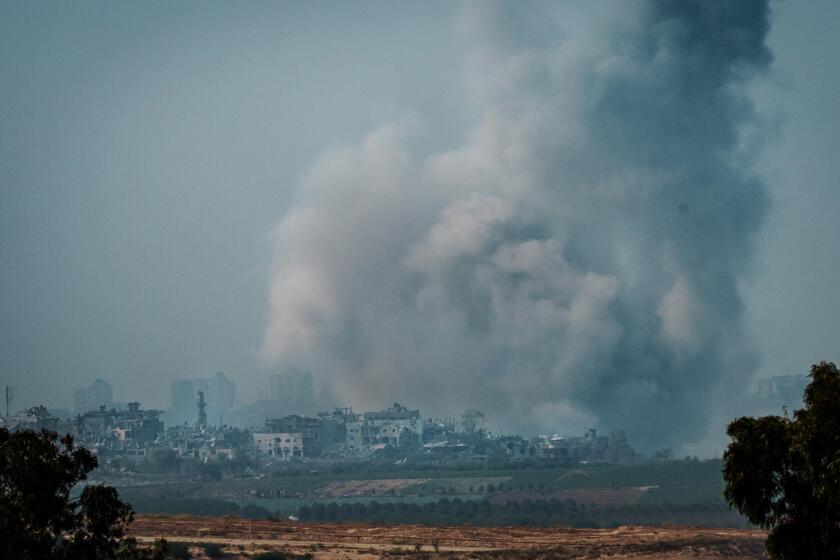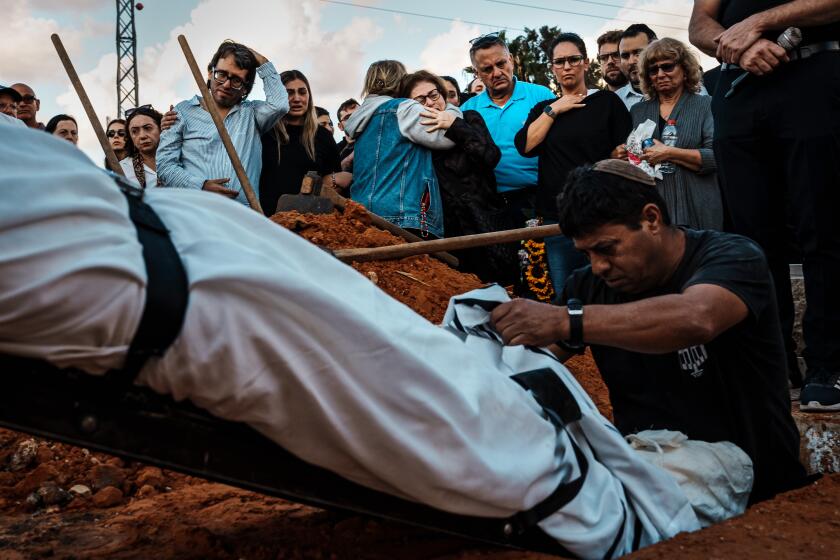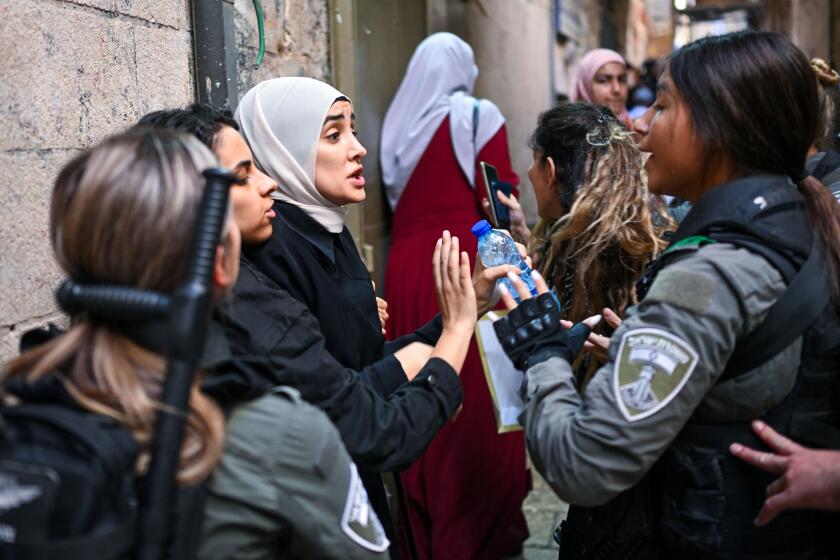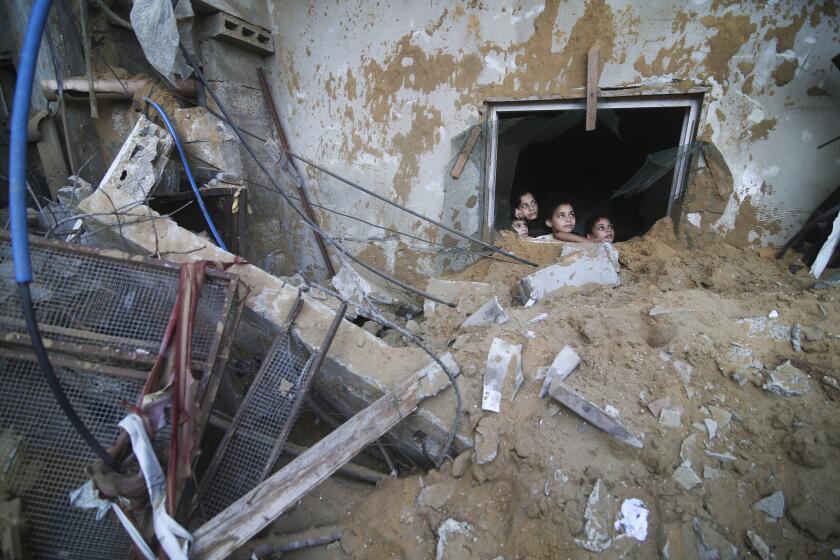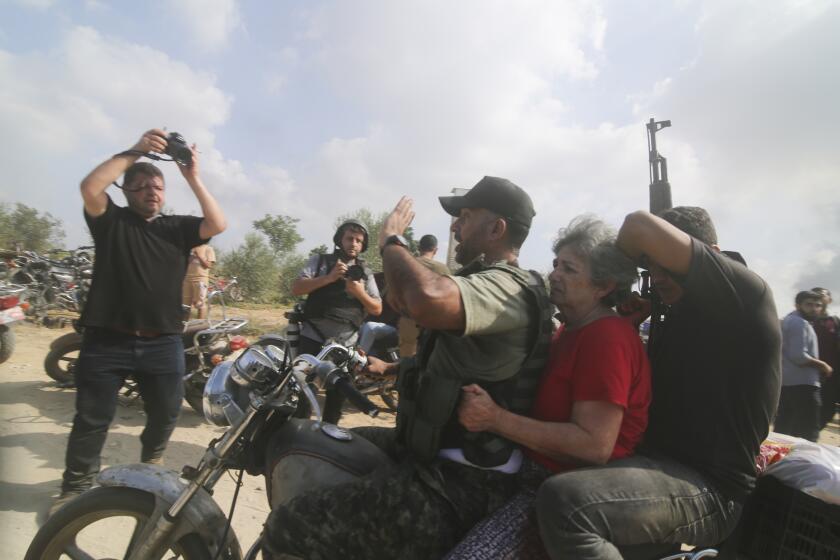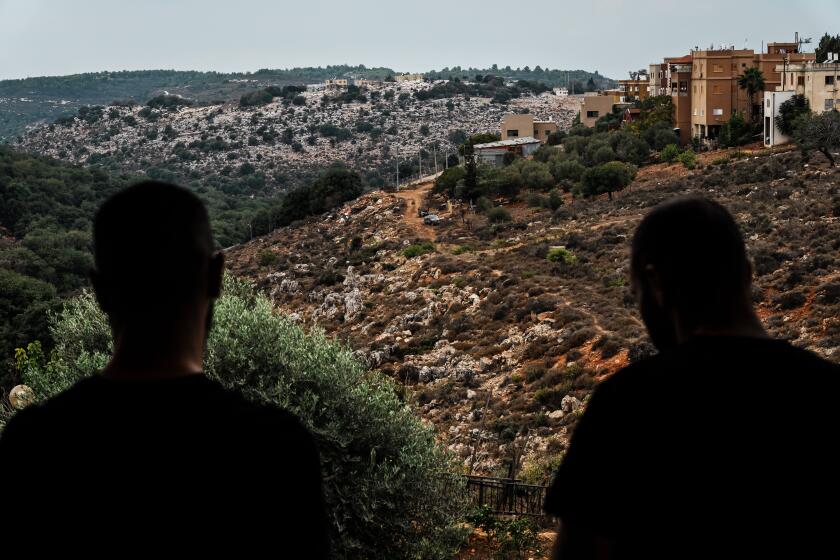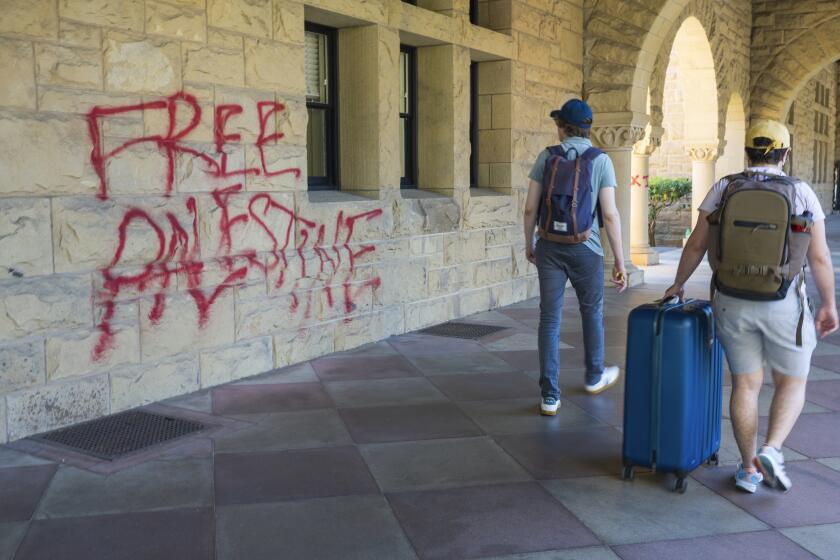What do Hamas and Israel see as the endgame? What would ‘victory’ look like?
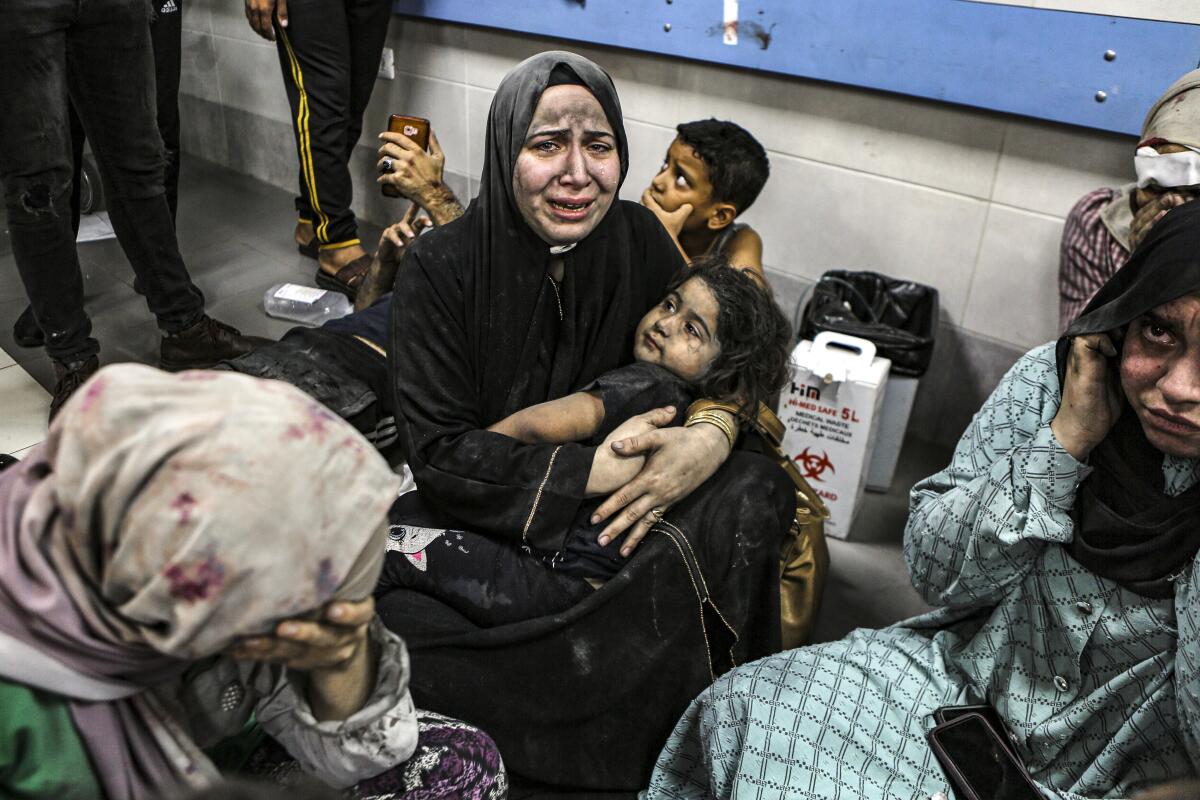
- Share via
JERUSALEM — Israeli troops and armor are massed on the periphery of the Gaza Strip. Hamas fighters, ensconced in tunnels deep beneath the ravaged coastal enclave, boast that they stand ready to inflict huge losses on invaders.
A potential ground offensive in Gaza, which Israeli leaders have signaled could begin at any time against the militant group Hamas, poses a perhaps unanswerable question for both sides: What would victory even look like?
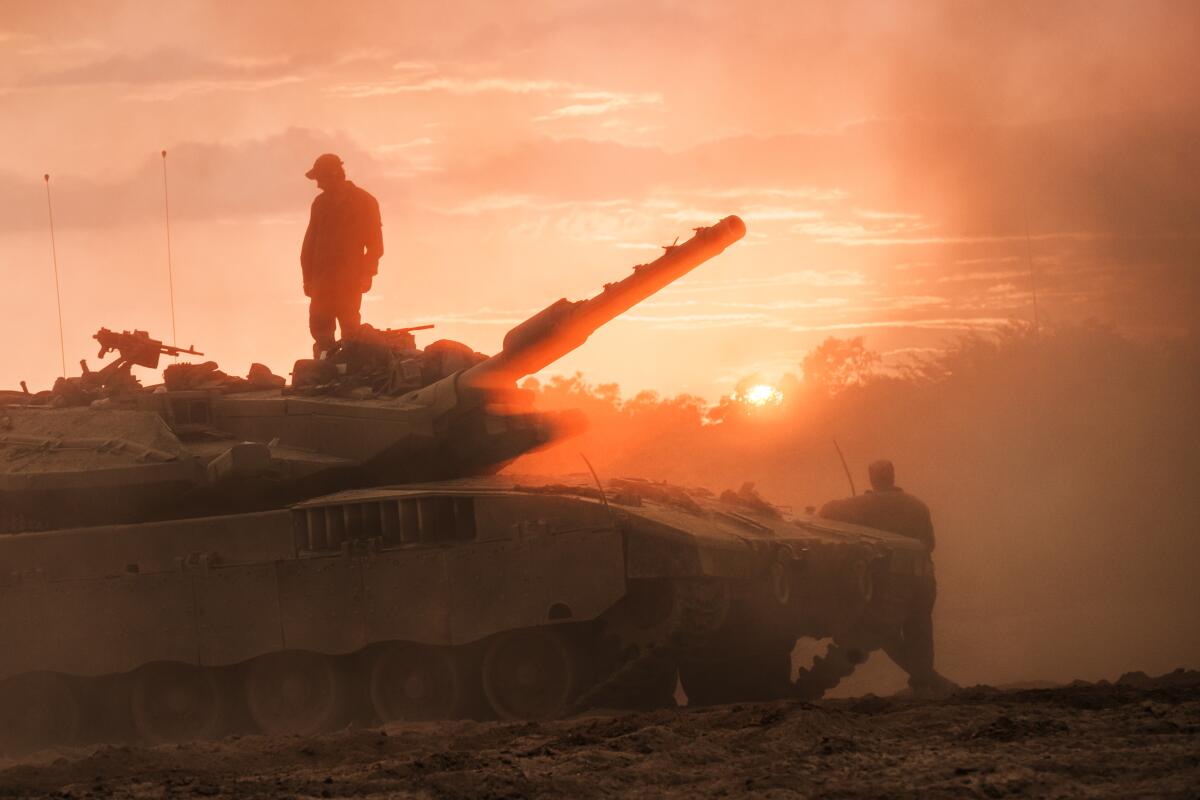
“It’s hard to think of this in terms of an endgame,” said Tareq Baconi, author of a recent book on Hamas and a visiting scholar at Columbia University’s Middle East Institute. “It’s anyone’s guess now — including Hamas — what the endgame is.”
The utter unpredictability of the course of Israel’s confrontation with Hamas came into horrifying relief Tuesday when a fiery blast enveloped a hospital in Gaza City that was packed with Palestinian civilians seeking shelter from ongoing airstrikes, killing hundreds.
Israel denied responsibility, saying the cause was an errant rocket fired by the Palestinian militant group Islamic Jihad; the Hamas-controlled Palestinian Health Ministry said the hospital had been hit by an Israeli airstrike. Islamic Jihad fighters have attacked Israel in concert with Hamas.
The Israeli military said in a statement on Saturday night that it was preparing a coordinated offensive in Gaza using air, ground and naval forces.
In any Gaza ground operation, Israel’s self-declared goal is to eradicate the militant group, which has ruled the coastal enclave since 2007. But beyond aiming to kill Hamas military leaders and remove the group from political power, Israeli officials have found it notably difficult to articulate exactly what would come next.
“We’re not thinking now what will happen the day after the war,” Israel’s ambassador to the United Nations, Gilad Erdan, told CNN on Sunday. “We need to win this war, and that’s the only thing that we’re focused on.”
Hamas, for its part, insists that whatever the outcome of the current war, it has permanently changed the calculus of its decades-long confrontation with Israel.
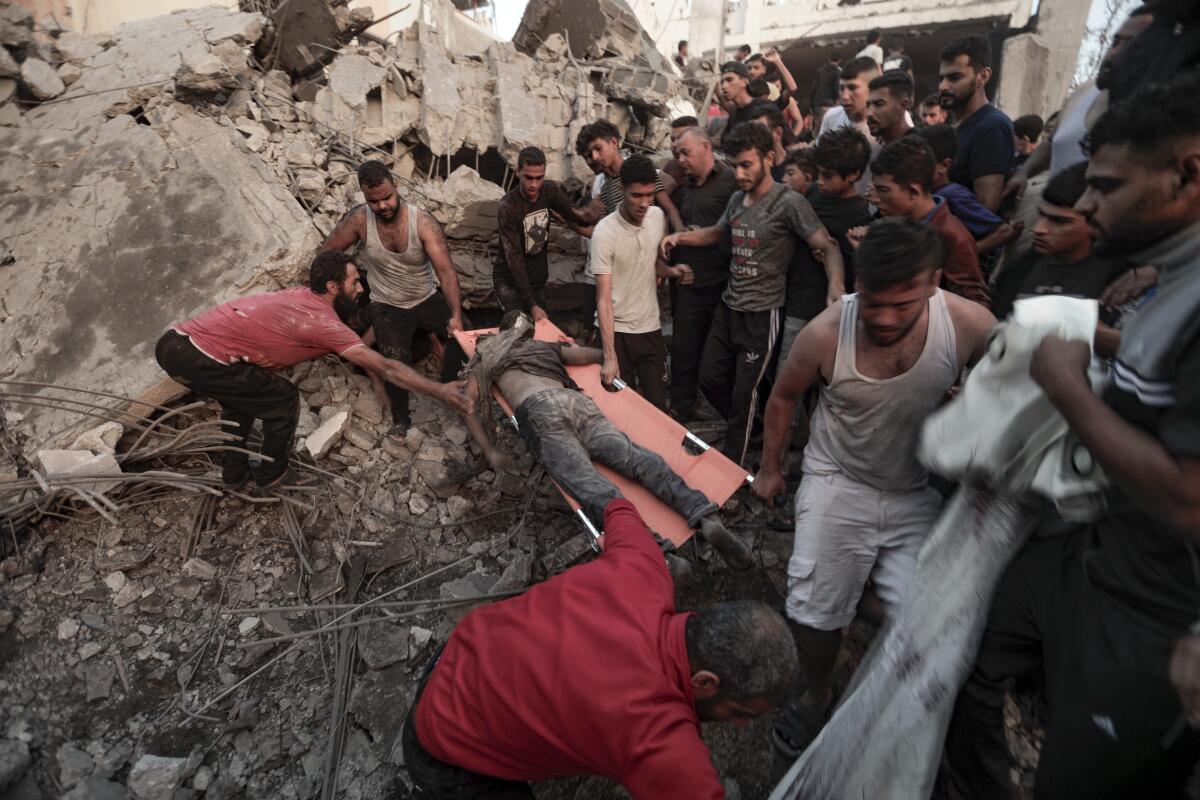
“Our capabilities have developed,” Usama Hamdan, a senior Hamas official in Lebanon, said in an interview. “The Israelis can’t turn back time.”
Israel-Hamas war: In Israel, a quest to identify unrecognizable bodies. In Gaza, bodies are piled and some stored in ice cream trucks as power fails.
Israeli public discourse about a Gaza operation has been heavily freighted with vows of retribution for the slaughter of more than 1,000 civilians — women, children, elderly, families — in the south of Israel on Oct. 7, when Hamas militants burst through the country’s high-tech border fence and cut an atrocity-filled swath through a string of small communities near Gaza.
“Every missile has a destination — we will reach every single member of Hamas,” Defense Minister Yoav Gallant told a squadron of fighter pilots on Tuesday. “We will destroy Hamas and strip it of its capabilities.”
In the onslaught, the assailants seized 199 hostages, Israeli officials say, presenting military planners with what may be their greatest conundrum in devising a battle plan. Israel traditionally spares no effort to bring captive compatriots home safely, even if it means engaging in extremely lopsided prisoner swaps.
Hamas has never held anything approaching this number of captives, and Gaza, though tiny, is full of places to hide them. Israel is also well aware that pitched street battles and the relentless airstrikes that have already leveled entire neighborhoods pose the risk of inadvertently killing at least some of the hostages.
Compounding Israelis’ sense of corrosive anxiety, Hamas on Monday night released its first hostage video of the war, featuring a 21-year-old woman named Mia Schem, who was seized when the attackers stormed a giant open-air dance party near Gaza, killing more than 250 people.
As the Jewish Sabbath fell and Muslims marked their principal prayer day, Israelis and Palestinians struggled with the terrifying new reality after the militant group Hamas’ deadly attack on Israel.
Appearing pale but composed, with her arm in a sling, the young woman asked for help in obtaining her freedom. Hours later, her mother pleaded for international support in bringing the hostages home.
“Until I saw the video, I didn’t know if my daughter was dead or alive,” Keren Sharf told reporters in Tel Aviv on Tuesday. “I am begging the world to bring my baby back home — she only went to a festival to have some fun, and now she is in Gaza.”
Hundreds of Palestinian Americans are reportedly stranded in Gaza, frantically searching for ways to flee before Israel’s expected ground assault.
Within Israel, families of those being held have been increasingly vocal in their demands that the captives’ safety be the paramount concern — even as Hamas signals that it intends to exact as great a price as possible for their freedom.
Hamas has demanded the release of 6,000 Palestinian prisoners in Israeli jails and is signaling it intends to use the hostages as a bargaining chip.
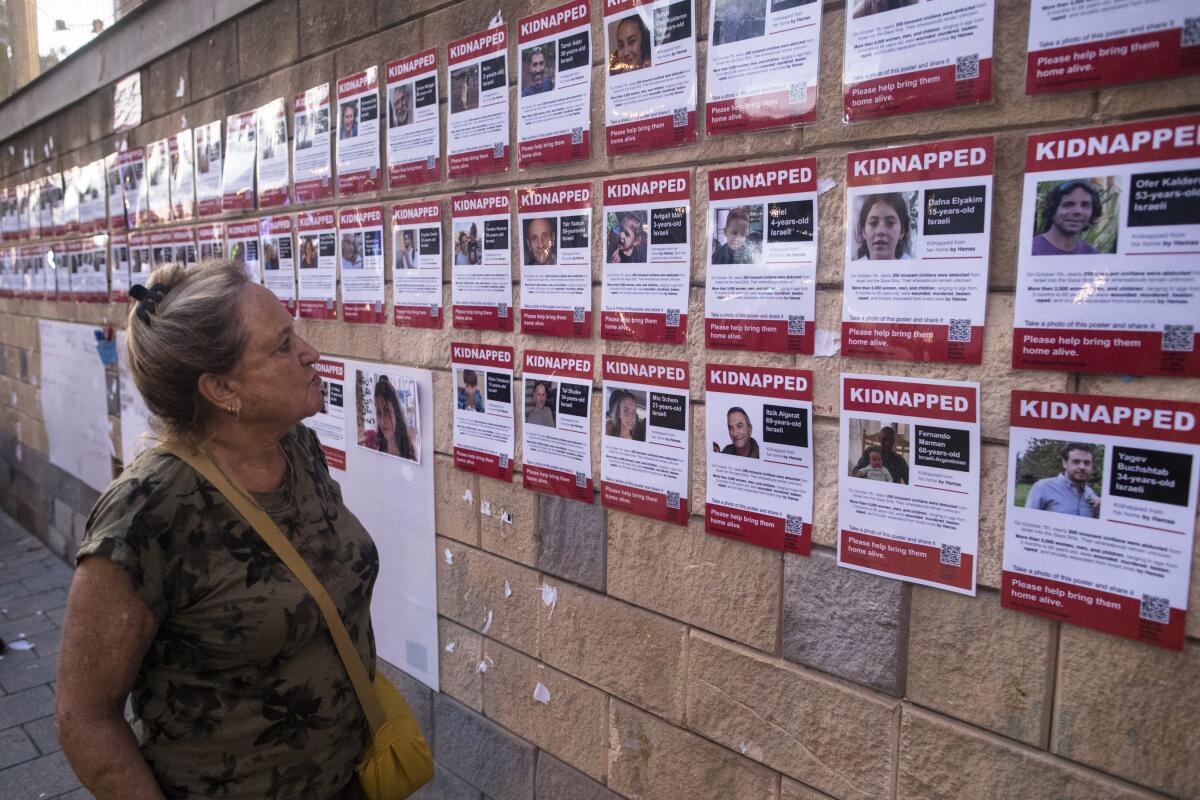
Khaled Meshaal, a Hamas official based in Qatar, told Al Araby television on Monday that seizing so many Israeli captives means that the group now “has what it needs to empty the prisons of all prisoners.”
Amid the burgeoning humanitarian catastrophe in Gaza, where more than 2 million Palestinian civilians are already deprived of basic daily needs such as food and medicine, rights groups and many outside parties are pleading with Israel to hold its fire — or at least allow in substantial amounts of critically needed aid supplies before the chaos of battle takes hold.
Israel has already been targeting Hamas commanders inside Gaza, and says it has killed half a dozen of the group’s leaders in the wake of the Oct. 7 attack. The army has also disclosed limited operations inside the Palestinian territory to try to free the hostages.
Hamas’ tactics are brutal and shocking, but its goal of ending Israel’s occupation is widely shared among Palestinians.
But in Israel, haunted by the worst massacre of Israeli civilians citizens in the country’s history, there is a sense that if the military does not strike a decisive blow against Hamas now, any illusion of safety for Israel’s citizenry is gone for good.
Deterrence has long been a linchpin of Israel’s defense strategy, and the government’s spectacular failure to anticipate and fend off the attack — whose lethal effectiveness appeared to surprise even Hamas itself — has led to a sharply heightened sense of potential peril from an array of regional foes.
Several senior Israeli security officials — although, notably, not Prime Minister Benjamin Netanyahu — have said they accept the blame, telegraphing the likelihood they will step down once the war is over.
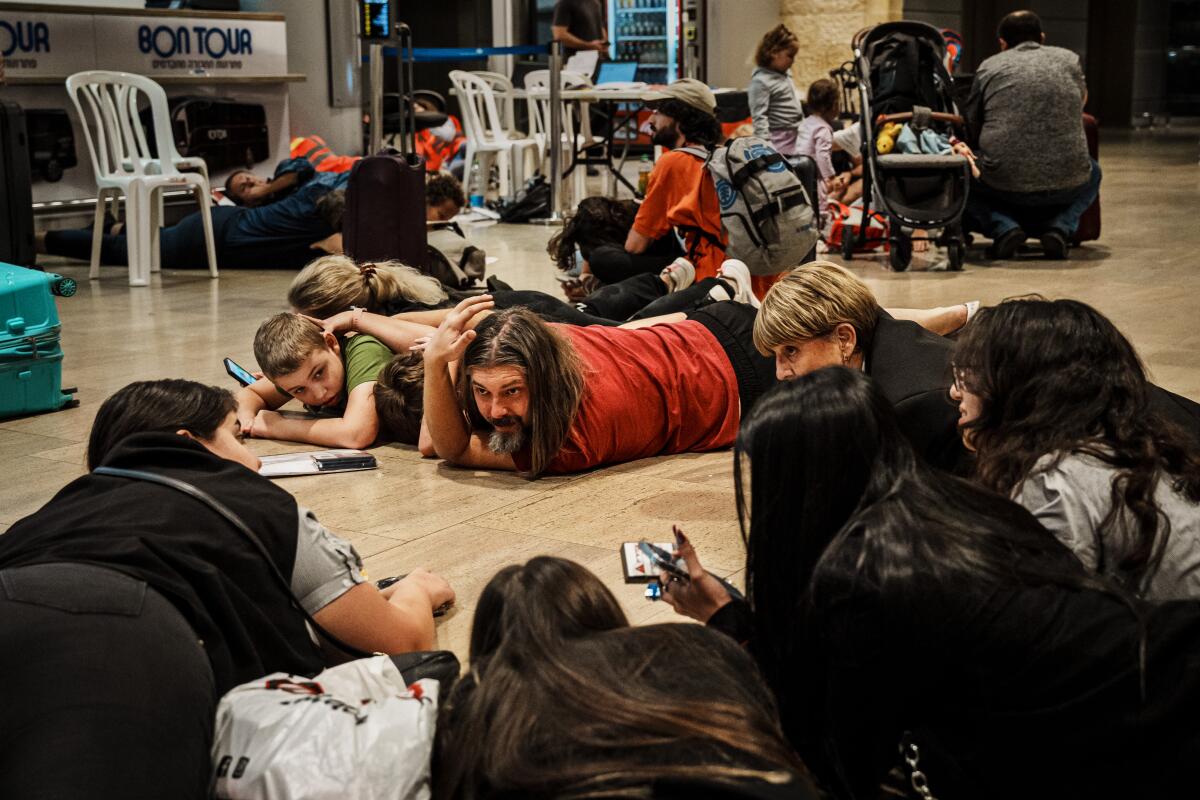
The latest of those was Ronen Bar, head of the domestic security agency, the Shin Bet, who told members of the agency Monday that “we were unable to generate a sufficient warning” of the Hamas attack, and “the responsibility for this is mine.”
President Biden, who is planning a visit Wednesday to Israel, has offered unwavering U.S. support for Israel in the aftermath of a slaughter he described as “evil.” But an Israeli ground invasion of Gaza — and furiously disputed high-casualty episodes such as Tuesday’s hospital explosion — would make that solidarity an infinitely more complex proposition.
On Israel’s border with Lebanon, residents are worried that groups like Hezbollah will join a war that eventually spirals into a regionwide conflict.
By unconditionally backing Israel in this next phase of the war, the U.S. administration would in effect accept a degree of responsibility in the already dire loss of civilian life among Palestinians.
Before the hospital explosion, more than 2,800 people have been killed inside Gaza so far, Palestinian officials have said, primarily in intensive bombardment of the blockaded strip. Hundreds of thousands are at grave additional risk due to the lack of food, electricity, clean drinking water and shelter.
In Gaza, where up to a million people are now displaced from their homes, the constant refrain is that from one end of the tiny, impoverished territory to another, there is nowhere to run, nowhere that is safe.
Mohammed Okasha, a 38-year-old father of two, described a hectic flight from his home in northern Gaza to a refugee camp in Gaza City, then to another part of the city after a nearby airstrike. He wanted to take his elderly parents to a U.N. shelter, but was afraid there wouldn’t be enough space or drinking water for them.
“We are afraid,” he said.
The Hamas-run Health Ministry in Gaza says an Israeli airstrike caused the blast. The Israeli military says Palestinian militants fired a barrage of rockets.
For Hamas, which in the past has shown scant regard for Palestinians’ lives and safety, the prospect of a bloody confrontation holds little real downside. And the group already has scored what is arguably its biggest triumph — its seemingly effortless breaching of Israel’s defenses on the frontier and within the nation.
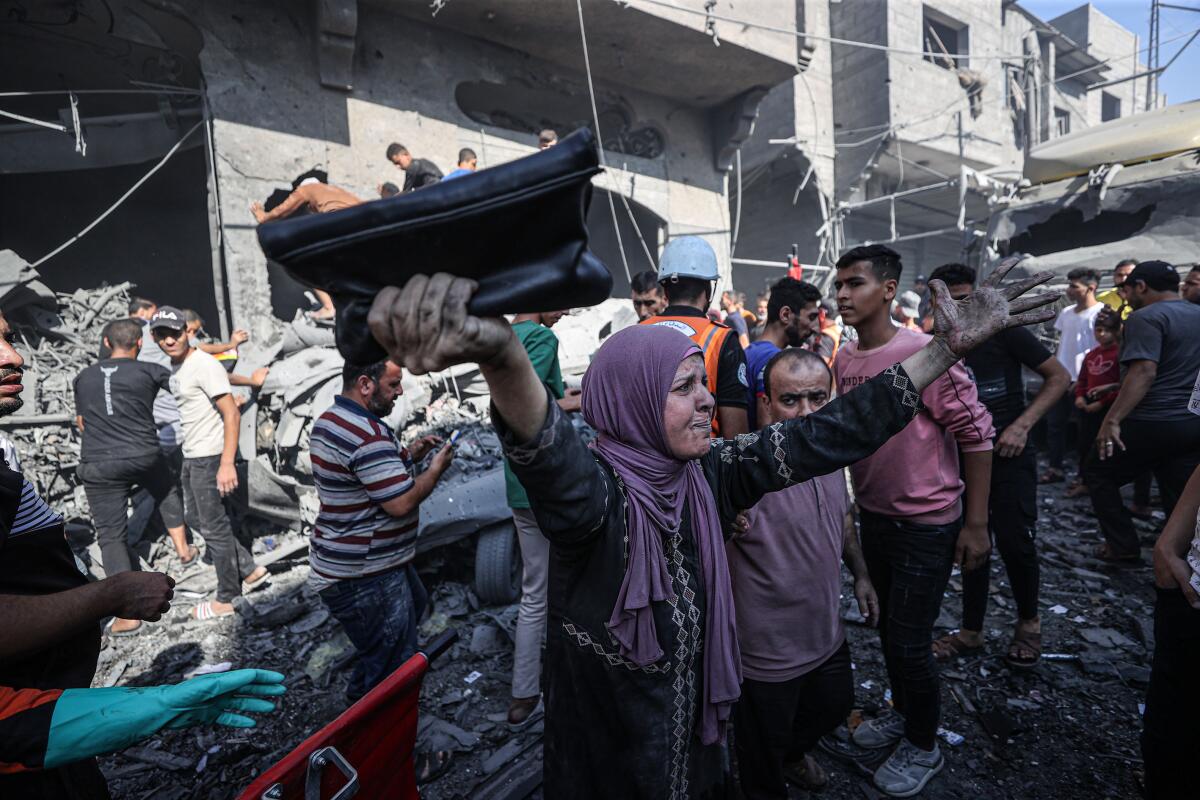
Even being roundly defeated militarily by Israel in Gaza might only fuel the group’s stature as a self-appointed defender of Palestinian aspirations.
And even if the short term went according to plan for Israel — top Hamas commanders were eliminated and the bulk of the hostages somehow freed unharmed — the longer-term picture is that of a potential quagmire.
Israel’s American backers appear to recognize that; Biden told “60 Minutes” that it would be a “big mistake” for Israel to reoccupy Gaza.
Nearly two decades after Israel pulled troops and settlers out of Gaza, there is little enthusiasm among all but the most hard-line segments of the Israeli public for a drawn-out reoccupation.
Some Israeli political figures, including opposition leader Yair Lapid, have floated the idea of a leadership role in Gaza for the Palestinian Authority, the entity that exercises civil control in the West Bank. But the authority is widely perceived as weak, corrupt and moribund, and would probably be viewed by Palestinians in Gaza as akin to a puppet administration of Israel.
Many veteran Israeli observers of the long confrontation with Hamas see little prospect that a ground invasion would produce any positive results. And nothing, they point out, can bring back dead innocents, on either side.
Journalist and author Gideon Levy, a prominent critic of Israel’s human rights record vis-a-vis Palestinians, said a large-scale Israeli incursion would probably be a fiasco, involving the “pointless” deaths of Israeli troops as well as Palestinian civilians.
“No one,” he wrote in a column for the Haaretz newspaper, “would emerge from these horrors for the better.”
A special correspondent in Gaza, who cannot be named for security reasons, contributed to this report.
